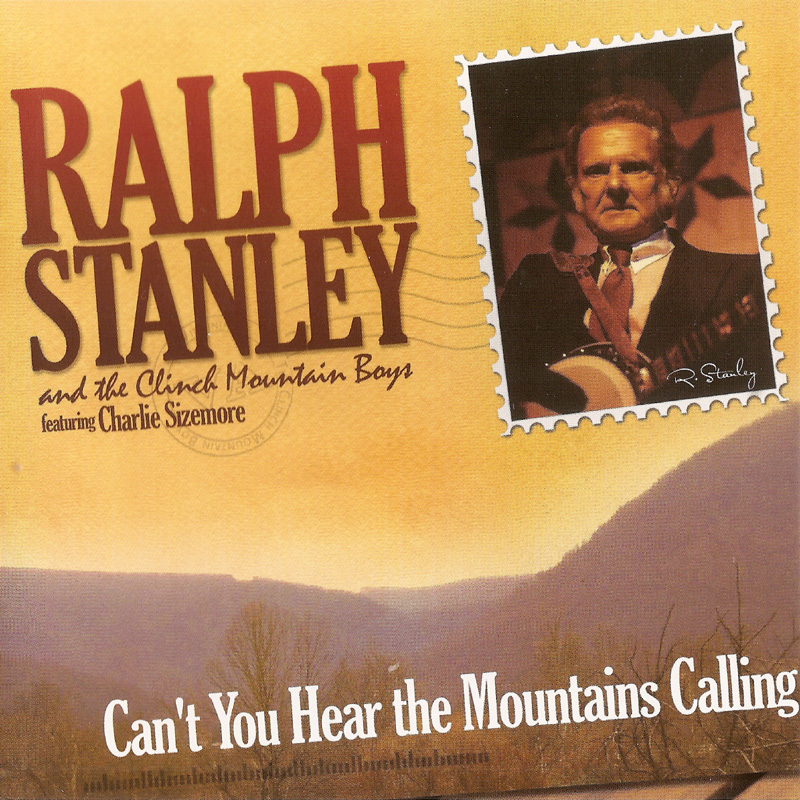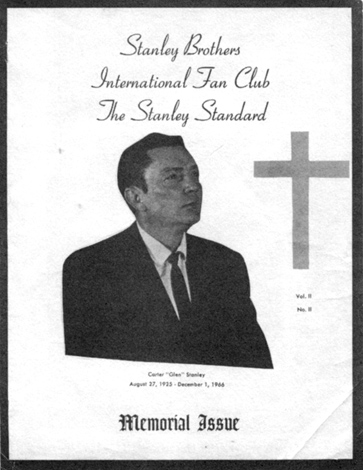- Bill Gatton Chevy Show
- Carter Stanley Interview - 1966
- How Far To Little Rock? - Search live shows
- Jim Kent's film 'Ralph Stanley's Bluegrass Festival'
- New WCYB Recording
- Pound Va. 1972 - Video
- Replica Rebel T-Shirt
- R.I.P. Ralph
- Roy Lee Centers Last Show
- Song & Memory Books
- Stanley Brothers - WCYB Acetate
- Stanley Standard - Carter Stanley Memorial Issue
- Suwannee River Jamboree
- Up In The Cloud - 1957-62
Stanley Standard - Fan Club Memorial Issue
This looks like it's an nth generation copy of the 'Memorial' issue of the Stanley Brothers fan club newsletter, the 'Stanley Standard' published in 1967,[1] by Fay McGinnis and Norma Fannin. Although the reproduction quality isn't great (i.e. it looks like a scan of a photocopy of the original mimeographed sheets),[2] hard-core Stanley fans will still find there's plenty here to absorb.
Fan Club Memorial Issue (26 Mb)
This edition of the 100-page newsletter was beset with production difficulties as Fay notes at some length in her two page introduction, and some of the content could have done with editing, but it's still a fascinating read in parts.
A good part of the journal is taken up with tributes to Carter, with letters from Ralph Stanley, their mother Lucy, Pee Wee Lambert's widow Hazel, Melvin Goins, Charlie Moore, Carl Story, Dave Freeman, E.P. Williams,[3] and loads of other fan club State / Foreign Country representatives, DJ's etc.
Other features include a report on the Carter Stanley Memorial Concert, which Walt Saunders (of 'Bluegrass Unlimited') has graciously allowed us to reproduce below; a piece on J.E. Mainer of the Mainer Brothers (one of the Stanley Brothers influences); a few concert report's including a Bill Monroe concert by Walt Saunders, the Stanley's 5th Nov 1966 show in Sandusky, Ohio, when Carter was too ill to attend; and the April - June shows from Brown County Jamboree from with Bill Monroe, Don Reno and Bill Harrell, and Ralph Stanley etc.
The journal also mentions the Wendy Smith tribute to Carter (Wendy Smith & The Windy Mountain Boys - Carter Stanley (Will Lead That Great Band) / Saviour Guide Me 7") and features a series of correspondence between Walt Saunders and the fan club, which mentions the two unearthed Blue Ridge cuts (versions of Little Maggie and Mother No Longer Awaits Me At Home) and other items like the alt. take of Our Last Goodbye.
Thanks to Gary B. Reid for sending this to me, and allowing us to reproduce it.
The Carter Stanley Memorial Concert
By Walter Saunders, Virginia Representative
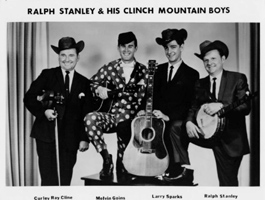
On April 9, 1967, the University of Maryland Campus Chest and Bluegrass Unlimited sponsored a benefit concert for the family of the late Carter Stanley. I attended, along with a friend of mine. We drove over to College Park, Md. in his car, a distance of 25 miles from where we live in Virginia.
We arrived early so I would have time to see Ralph Stanley before the show started. I went to the backstage area and saw Ralph's station wagon parked outside, so down to the dressing rooms I hurried, where I introduced myself. I had talked to Ralph on a number of occasions in the past 10 or 12 years, but only as a fan getting autographs, etc. and not as a representative of his fan club. He was very friendly, and when I said there were some questions in my mind I wanted to clear up, he said ""Shoot". I then asked him several questions about the early years with Carter, about several former members of the band and their present whereabouts, early Stanley Brothers recordings, etc. After some discussion on these subjects, I asked him if he plans to continue playing the same old-time, traditional mountain style music that was always the trademark of the Stanleys. He answered with an emphatic "Definitely". I was also introduced by my friend Dave Montague, to Ralph. Dave has been a follower of bluegrass about as long as I, besides being a competent bluegrass musician, and was quite thrilled to meet Ralph.
Afterwards we wandered around downstairs, listened awhile to Don Stover and Tex Logan warming up for some banjo and fiddle numbers and talked with Gary Henderson of 'Bluegrass Unlimited' and various performers.
Gary Henderson opened the show promptly at 2p.m. and brought on the first act - Jim Greer and the Mac-O-Chee Valley Boys. This was my first time to see this group but I was quickly impressed with their wide repertoire of songs and with Greer's talent. He plays banjo, mandolin and 12-string guitar equally well. This group has worked out a good act and "Poor Rebel Soldier" and "Campin' In Canaan's Land" were several numbers I thought were done quite well.
Tom Reeder of WDON in Wheaton, Md. brought out the next act - Buzz Busby and his Bayou Boys. Buzz used to have a TV show here in the '50s, and Bill Emerson, the banjoist has been around quite a while, played with Jimmy Martin, Country Gentlemen and others. Wayne Yates on mandolin has also been on the scene for some time, with Red Allen and before that he and his brother Bill had their own band 'The Clinch Mountain Ramblers'. Buzz sang one of his old hits, Me And The Juke Box which was the only way I could recognize him, his appearance has changed so much. The bass player, Earl Brown sang a solo number Today Has Been A Lonesome Day which I thought was one of the highlights of the act. Yates sang Honey You Don't Know My Mind, a pleasant version. His mandolin skill has improved markedly in the last year, possibly due to the influence of Buzby who used to be one of the best mandolinists around. Emerson did two excellent instrumentals, Sweet Dixie and Tennessee Breakdown. He is certainly one of the best banjo pickers in the business. The group closed with Give This Message To Your Heart and extremely well done trio number in the style of the Osbornes.
Red Shipley of WKCW in Warrenton, Va. spoke about the show, explained that proceeds were going to Carter's family. He made an appeal for blood donations for Carter, and brought out the fact that about 85 pints were used during his illness. At $31.00 a pint, this amounts to quite a lot of money. A Red Cross table had been set up to one side to facilitate the signing donors.
Next on the program was Doc Watson and his son Merle Watson. I had never seen Watson before and I must say that I enjoyed his portion of the show immensely. His is not a bluegrass act, rather oldtime pickin' and singin' in the Delmore Bros. tradition. Some Travis style picking was featured on Deep River Blues. Lack of sight has not hampered Doc's mastery of the guitar and his finger flew over the fingerboard and his voice rang thru the auditorium. Otto Wood and Southbound were two well done numbers. He was simply accompanied throughout by his son. He closed with Streamlined Cannonball - some terrific picking on this one. Doc has won himself a new fan, yours truly.
The New River Boys were next. This is the band of Alex and Olabelle, however they were not present for this show. June Campbell (Alex's daughter??) did a good job on Old Slew Foot. The mandolin player, a 15 year old from N.J. impressed me. He has the promise of developing into a first rate musician. His playing of Billy In The Low Ground was quite good.
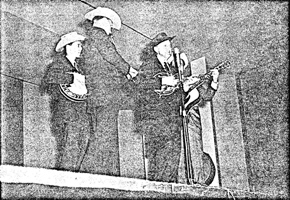
A real treat was in store for bluegrass fans next. Doc Watson came back out with none other than Bill Monroe to render a few duets in the old Monroe Bros. style. What Does The Deep Sea Say went over quite well. Next was What Would You Give In Exchange For Your Soul, Bill's first recording back in 1936, and one of the most beautiful numbers of the day. Doc's voice blended perfectly with Bill's. Then an instrumental Watson Blues that Bill named in honor of Doc while they were playing on the West Coast. Feast Here Tonite and East Tenn. Blues rounded out this part of the show and really brought down the house. Truly a memorable experience.
The Country Gentlemen were the next group on stage, and they started out with some of their hits This Morning At Nine, Copper Kettle done in the inimitable Gentlemen style. These boys are all accomplished musicians, and have played together about 10 years. To me the highlight of their performance was The Fields Have Turned Brown written by Carter Stanley. The Gentlemen are one of few that can do justice to Stanley Bros. songs. Their trios are generally excellent, one reason being the clear, strong baritone of their banjoist Eddie Adcock. They did their new Rebel release Matterhorn next - a real good new song. I also enjoyed New Freedom Bell, and anyone who hasn't heard this one can't imagine how high pitched their voices get - fantastic. Their quartet arrangement of A Beautiful Life was first class. The Gentlemen have been subjected to some criticism recently because of several songs they have recorded. Like Duffey, spokesman for group says, "We don't analyze 'em, we just sing 'em." They are one of the leading exponents of bluegrass, although some prefer to call their style 'Progressive Bluegrass'. Whatever they are, they remain one of my favorite groups.
After an intermission, the great Mac Wiseman came out, along with Don Stover and Tex Logan. Mac's first number was Wabash Cannonball, one of his hits for Dot Records. It's always a pleasure to hear the 'Voice with a Heart' and I think it's unfortunate that he no longer has his own band. Of course, Logan and Stover did very well backing him up, but something is lacking on Mac's recent shows and I feel it's the fact that he has to work with made up bands. I Wonder How The Old Folks Are At Home and Jimmie Brown, The Newsboy were both put across very well. Those who like the old fiddle, banjo duets would have enjoyed Stover and Logan's contributions.
At this point, half way thu Mac's act, I had to leave the auditorium for about half an hour in order to get something to eat. When I returned Mike Seeger was just bring his part of the show to an end. I only caught three numbers, but Drifting Too Far From The Shore - a trio, was the best of these, I thought.
Roy Sykes and his band came on stage next. This was a pleasant surprise for me. I first heard of Roy Sykes about 10 years ago, while visiting down in southwestern Virginia, and he is mentioned in the album liner notes on King #834 'Folk Concert/Stanley Bros.' and also Stanley Standard in Darrell Lambert Memorial article. I had no idea he was still actively engaged in bluegrass music. He told several interesting things I had never heard before - how he and Carter met at Camp Mead, Md. when they were discharged from the Army in 1946, and decided to form a band - how they played their first show at Ervington High School, where Ralph and Carter had once attended. He also told of their first radio show over WWVA, Norton, Va. Roy asked how many in the audience hailed from southwestern Virginia and quite a few cheered and raised their hands. I particularly noticed a blond sitting nearby who waved her hand frantically. Roy is fiddler for the and, and his brothers Jack and Ollie play banjo and mandolin respectively. They did several good numbers Teardrops In My Eyes and Love Please Come. The high point of their show was a tribute in song to Carter Stanley. Will The Roses Bloom Where He Lies Sleeping written a number of years ago by Roy Sykes and recorded by Flatt and Scruggs. They did it with a lot of feeling and it brought a lump to my throat. Patsy Stoneman of the famous Stoneman family came out and did several numbers with the Sykes group and they ended with a good banjo solo by Jack Sykes - Home Sweet Home.
Following the Sykes band were George Wynn and the Bluegrass Partners, a group from the Richmond, Va. area and another group I hadn't seen before. Wynn is mandolinist for the band and he does a fine job. The fiddle player, Sonny Mead is the spark of the band, and his rendering of Mocking Bird and German Waltz were extra good. I knew the latter tune as Wednesday Night Waltz. A real good sounding group that I hope to hear more of.
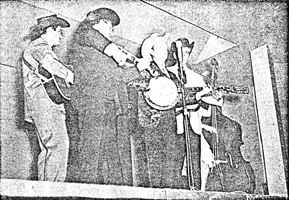
Finally, Ralph Stanley and the Clinch Mountain Boys were introduced. It was very saddening to see them come out on the stage without Carter. It was almost like I expected him to walk out and join them at any moment. I had to force these thoughts from my mind, and concentrate on the realities at hand. This was, of course, my first opportunity to see Ralph's new group and I noticed immediately that Shuffler is no longer with him. They kicked off with How Mountain Girls Can Love and right away I could see why Larry Sparks was chosen as guitarist and lead singer. His voice blends perfectly with Ralph's and they retain much of the original sound of the Stanley Bros. Lost Train Blues was next featuring Curly Ray Cline on fiddle. Curly was one of the original member of the Lonesome Pine Fiddlers and an excellent fiddler to say the least. Then a solo by Sparks Just Because done very well. Ralph is spokesman for the band now, and by this time all the band members had been introduced - Melvin Goins on guitar and June Campbell of New River Boys filling in on bass. Ralph spoke about his intention to continue playing the same traditional songs as Carter and he had always done. He then did a medley of solo songs - Little Maggie, Pretty Polly, Wild Bill Jones. The audience really loved these selections and showed their appreciation with thunderous applause. His voice was in perfect control, and I have never heard him sing more beautifully. The running banjo background for his singing was the best I have heard him do. I would rather hear him pick the banjo than anyone else I know of. When he did Man Of Constant Sorrow it nearly brought the roof down. Think Of What You've Done came next, with Ralph and Sparks singing duet, and Sparks' voice was so nearly like Carter's that it brought tears to my eyes. I happened to glance over toward the blond from southwestern Virginia and saw that she was weeping unashamedly. The tears began to roll down my face too, and I closed my eyes and it seemed once more that I was listening to the great Stanley duet. I am generally not too emotional, but at this point I was so choked up that I may have missed writing down all the numbers they did. Two more duets I Don't Want Your Rambling Letters and Hills Of Roane County also showed Ralph and Larry's voices to be so very well matched. A quartet number, Working On A Building was put across nicely. Ralph mentioned that in 2 or 3 weeks they are going to Cincinnati to cut a new album. A local musician, Tom Morgan who was filling in on mandolin, sang a pleasant duet with Ralph - Hey, Hey, Hey. Cline did another very good fiddle piece called Buckin' Mule.
Ralph thanked all the entertainers who were performing free of charge, and the audience for their support at the concert. Ralph's closing selection was Another Night, which they did to perfection. The applause, as they left the stage, was tremendous.
Last, but by no means least, Bill Monroe and His Blue Grass Boys came out on stage. I noticed right away that he has a new fiddler and guitarist. I didn't get the fiddler's name, but he did an excellent job on Sally Goodin'. His now guitar player is Benny Williams who rendered a good version of I Am A Pilgrim. Bill's son James plays bass and Lamar Grier is banjoist. Grier did Bluegrass Breakdown and I believe that he has improved since I last saw the band. One trio number was featured, Uncle Pen with Bill, Grier and Williams proving that they are capable of some real good trio singing. Rawhide revealed the fact Bill can still play some terrific mandolin. Next Bill did a medley of solo songs Molly And Tenbrooks, Little Maggie, Little Georgia Rose and several others which showed off his clear tenor voice. Bill called Mac Wiseman back on stage and they did Can't You Hear Me Callin' which Mac recorded with Bill year ago with Columbia. It was a real treat, to hear them together again. As a fitting climax to the day, Bill called Ralph Stanley, Curly Cline and Melvin Goins to join Mac and himself on stage. He asked them to join him singing Swing Low, Sweet Chariot. Bill said this was the hardest song he ever had to sing when he did it at Carter's funeral. He invited the audience to join them on the chorus. It was a stirring experience for me as I sat there joining the two legendary men of bluegrass music, Bill Monroe and Ralph Stanley in a tribute to the memory of an equally legendary figure, Carter Stanley. Tears filled my eyes again as I sang along with them, and to say it was an emotional moment would be putting it mildly.
Immediately following Bill's show, another appeal was made for blood donors. I went up front and pledged a pint. We left the auditorium and stepped into the night, and I looked at my watch. It was past 9p.m. and we'd been listening to music for 7 hours, but it hadn't seemed half that long.
Driving back to Virginia, my buddy Dave and I discussed the show quite a bit. He said something then that really got me thinking. Referring to Ralph Stanley, Dave called him a 'living legend'. I had always thought of Monroe in this manner, but I have to agree that surely Ralph has become a 'living legend' also.
I feel that everyone connected with the show deserved a lot of credit. The sponsors and performers - all of them did their part, not out of any desire for money, but because they wanted to do something for the family of - and in memory of - a great singer, musician and friend to many.
Of interest to some may be the fact that not one Dobro was in evidence during the entire show. This might be significant of some trend away from it's use, although it is a little early to tell. Another possibility significant point to consider was the wide use of the mandolin in nearly all of the performances. It would appear that this instrument is returning to its rightful place in bluegrass music. For a time, it seemed that the dobro might eventually replace it in many grass bands. Certainly there seems to be quite a few mandolinists emerging on the scene. Also interesting was the total lack of tape recorders. I saw not one taper in evidence.
All things considered, it was probably the best concert I have yet attended.
Walt Saunders
NB: It looks like the Carter Stanley Memorial concert was taped, including the performances by Ralph, Bill Monroe, Country Gentlemen, Mac Wiseman, Buzz Buzby, Roy Sykes, George Wynn etc. Details of the tapes can be found online in the 'Pete Kuykendall Collection, 1938-1995' at the Wilson Library, University of North Carolina at Chapel Hill.

[1] The journal has a publication date listed as May 1967, but as it has a report from the Bean Blossom Brown County Jamboree dated 24/25th June, it presumably must have come out later, possibly July 1967.
[2] For those too young to remember, mimeograph's were a kind of way of manually duplicating typed stencil sheets which preceded the photocopier. See:- https://en.wikipedia.org/wiki/Mimeograph
[1] E.P. Williams was a long time friend of the Stanley's - they recorded his I'd Rather Be Forgotten for Mercury (71258), and Ralph's Hymn Time LP was recorded for E.P. Williams' 'Blue Jay' label.

